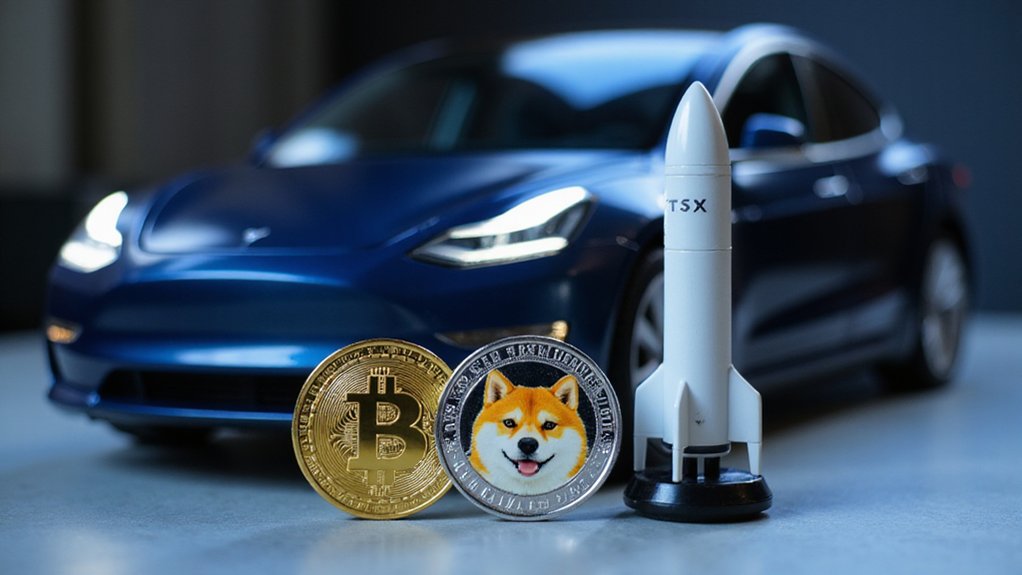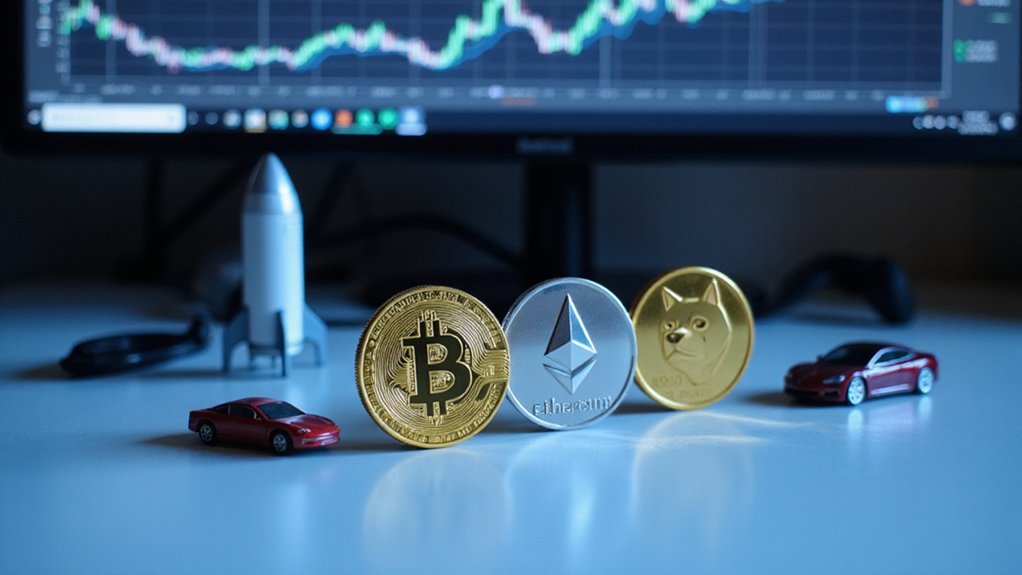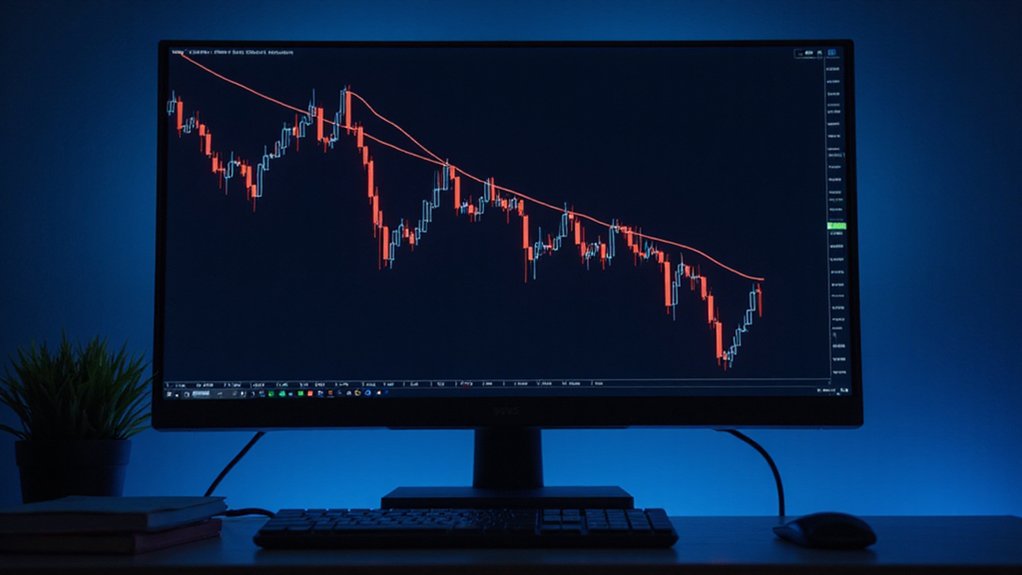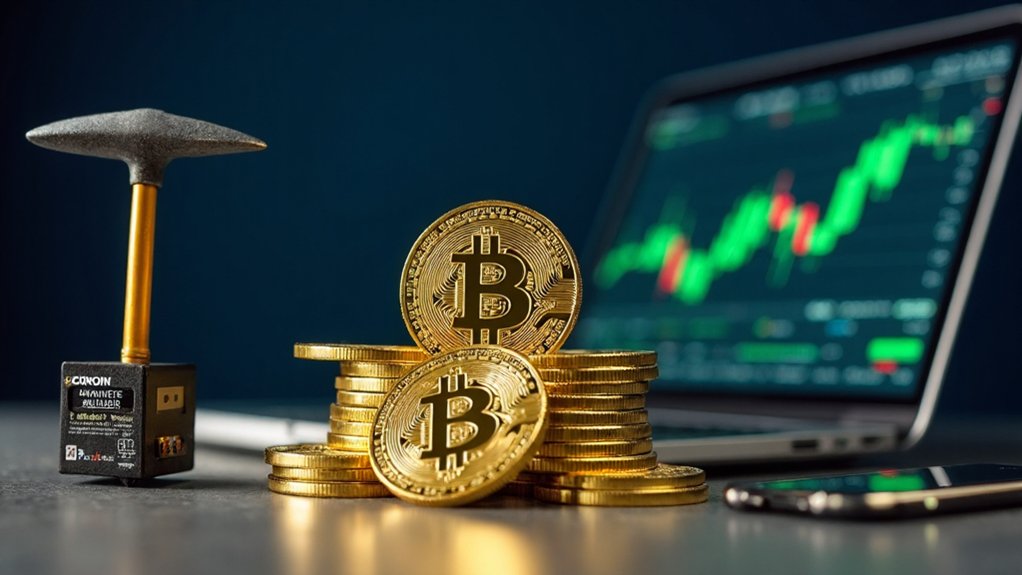Elon Musk owns three major cryptocurrencies: Bitcoin, Ethereum, and Dogecoin. Tesla’s $1.5 billion Bitcoin purchase in 2021 confirmed his serious interest in digital assets, though the company later divested portions. Ethereum entered his portfolio as a smart contract play, while his self-styled “Dogefather” persona transformed the once-joke cryptocurrency into a legitimate market contender. Musk’s crypto strategy favors established protocols with demonstrated utility and strong communities—a portfolio that reveals more about his investment philosophy than many realize.

Tech titan and market mover Elon Musk maintains a surprisingly streamlined cryptocurrency portfolio despite his outsized influence on digital asset markets. The CEO of Tesla and SpaceX has confirmed ownership of just three cryptocurrencies: Bitcoin, Ethereum, and his apparent favorite, Dogecoin—a demonstration to his preference for established protocols with distinct value propositions rather than the sprawling altcoin landscape that his tweets occasionally send into price convulsions.
Musk’s Bitcoin holdings, publicly acknowledged since 2021, represent his most conventional crypto investment. The billionaire appears to view BTC primarily as “digital gold”—a deflationary store of value rather than a payment mechanism. This perspective aligns with Tesla’s $1.5 billion Bitcoin acquisition (though the company has since divested significant portions of that position). His personal BTC holdings remain intact, reflecting a long-term conviction in the asset’s fundamental proposition.
Ethereum constitutes the second pillar of Musk’s confirmed crypto portfolio. His ownership of ETH, revealed during “The ₿ Word” conference, suggests an appreciation for the network’s smart contract capabilities that power decentralized finance and NFT ecosystems. As the second-largest cryptocurrency by market capitalization, Ethereum represents a logical complement to Bitcoin in any diversified crypto allocation.
Perhaps most significantly, Musk’s affinity for Dogecoin transcends mere investment. Self-styled as “The Dogefather,” his persistent advocacy for the meme-based cryptocurrency has transformed a project created as a joke into a top-ranked digital asset. Dogecoin’s Scrypt algorithm makes it less energy-intensive than Bitcoin, potentially appealing to Musk’s environmental concerns while maintaining crypto functionality. His public enthusiasm has sparked remarkable price appreciation—a hypothetical $1,000 DOGE investment from six years ago would have multiplied exponentially following his endorsements. His 2019 tweets about Dogecoin elevated the cryptocurrency from an obscure joke to a high-profile investment that gained mainstream attention.
Beyond this trinity of digital assets, Musk’s cryptocurrency holdings remain speculative. Despite occasional market rumors suggesting broader investments, no credible evidence confirms ownership of additional tokens. His investment approach appears surprisingly straightforward: focus on established cryptocurrencies with demonstrated utility, strong communities, and technical foundations—a strategy that, somewhat ironically, contradicts the market chaos his social media activity routinely provokes.
Frequently Asked Questions
How Has Musk’s Crypto Involvement Affected Tesla Stock Prices?
Musk’s cryptocurrency dalliances have produced a fascinating ripple effect on Tesla’s valuation.
The company’s $1.5 billion Bitcoin investment created immediate balance sheet implications, while his environmental about-face regarding Bitcoin payments triggered notable stock volatility.
Additionally, his cryptocurrency pronouncements (particularly on Twitter) have periodically influenced investor sentiment toward Tesla itself.
The correlation isn’t always direct—Tesla stock movements reflect multiple factors—but Musk’s crypto adventures have undeniably become one component of the company’s financial equation.
What Crypto Trading Platforms Does Elon Musk Personally Use?
Elon Musk has never publicly disclosed which crypto trading platforms he personally uses—a notable omission given his market-moving commentary.
While speculation inevitably swirls around established exchanges like Coinbase or Binance, high-net-worth individuals typically employ bespoke solutions with enhanced security protocols and private execution services.
His Tesla corporate investments were likely facilitated through institutional channels rather than retail platforms, rendering public conjecture about his personal trading infrastructure fundamentally academic.
Has Musk Ever Lost Money on Cryptocurrency Investments?
While public disclosures regarding Musk’s cryptocurrency losses remain limited, it’s virtually certain he’s experienced downside exposure.
Tesla significantly sold 75% of its Bitcoin holdings in Q2 2022—presumably at a loss given market conditions.
The characteristically volatile nature of digital assets (Bitcoin’s 65% drawdown in 2022 alone) makes portfolio depreciation practically inevitable, even for billionaires.
What remains unknowable is the magnitude of these losses relative to Musk’s substantial wealth—likely rendering them financially inconsequential despite their absolute size.
How Much of Musk’s Net Worth Is in Cryptocurrency?
The precise percentage of Musk’s net worth tied to cryptocurrency remains undisclosed publicly.
While Tesla’s initial $1.5 billion Bitcoin investment represented a minuscule fraction of his wealth (predominantly anchored in Tesla and SpaceX equity), his personal holdings—spanning Bitcoin, Ethereum, and his beloved Dogecoin—likely constitute a symbolically significant but financially modest portion of his portfolio.
Given Tesla’s subsequent divestiture of most Bitcoin holdings, crypto’s representation in Musk’s estimated $200+ billion net worth is almost certainly negligible.
Does Musk Consult Financial Advisors for His Crypto Investments?
While Musk certainly has access to elite financial advisors, public information about his consultation practices for cryptocurrency investments remains remarkably scarce.
His investment approach appears characteristically maverick—driven more by personal convictions and market intuition than traditional advisory frameworks.
Given his penchant for market-moving tweets and seemingly impulsive crypto-related decisions, one might reasonably speculate that Musk’s investment strategy exists somewhere in the nebulous space between calculated risk and high-profile financial performance art.









